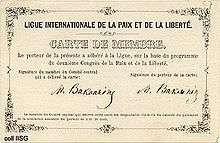League of Peace and Freedom

The Ligue internationale de la paix (League of Peace and Freedom) was created after a public opinion campaign against a war between the Second French Empire and the Kingdom of Prussia over Luxembourg. The Luxembourg crisis was peacefully resolved in 1867 by the Treaty of London but in 1870 the Franco-Prussian War could not be prevented so the league dissolved and refounded as the 'Société française pour l'arbitrage entre nations' (League of arbitration between the Nations) in the same year.
The Société française pour l'arbitrage entre nations can be seen as a precursor of the Permanent Court of Arbitration, founded with the first Hague Peace Conference in 1899, and a precursor of the League of Nations, founded with the Treaty of Versailles in 1919 and followed by the United Nations. The establishment of the Permanent Court of Arbitration was also set up by the Inter-Parliamentary Union that Frédéric Passy founded together with William Randal Cremer in 1889.
Inaugural Congress
The Inaugural Congress of the League of Peace and Freedom (French: Ligue internationale de la paix et de la liberte) was originally planned for September 5, 1867 in Geneva.[1] Emile Acollas set up the League's Organising Committee, which enlisted the support of John Stuart Mill, Élisée Reclus, and his brother Élie Reclus.
Other notable supporters included contemporary activists, revolutionaries, and intellectuals such as Victor Hugo, Giuseppe Garibaldi, Louis Blanc, Edgar Quinet, Jules Favre, and Alexander Herzen. Ten thousand people from across Europe signed petitions in support of the congress.[2]
They also counted on the participation of the International Workingmen's Association (IWMA), inviting the sections of the IWMA and its leaders, including Karl Marx, to attend the Congress. They decided to postpone the opening of the Congress until September 9, so as to enable delegates of the Lausanne Congress of the IWMA (to be held on September 2–8) to take part.
While the balloting was going on, Citizen Marx called attention to the Peace Congress to be held in Geneva. He said: It was desirable that as many delegates as could make it convenient should attend the Peace Congress in their individual capacity; but that it would be injudicious to take part officially as representatives of the International Association. The International Working Men’s Congress was in itself a peace congress, as the union of the working classes of the different countries must ultimately make international wars impossible. If the promoters of the Geneva Peace Congress really understood the question at issue they ought to have joined the International Association. [From The Bee-Hive Newspaper August 17, 1867, reporting on a meeting of the IWMA Central Council.]
The anarchist Mikhail Bakunin also played a prominent role in the Geneva Conference, and joined the Central Committee.[3] The founding conference was attended by 6,000 people. As Bakunin rose to speak:
the cry passed from mouth to mouth: "Bakunin!" Garibaldi, who was in the chair, stood up, advanced a few steps and embraced him. This solemn meeting of two old and tried warriors of the revolution produced an astonishing impression .... Everyone rose and there was a prolonged and enthusiastic clapping of hands[4]
References
- ↑ Sandi E. Cooper (1991). "Pacifism in France, 1889-1914: International Peace as a Human Right". French Historical Studies. 17. JSTOR 286462.
- ↑ Mark Leier. Bakunin: The Creative Passion. St. Martin's Press: New York, 2006. p. 178.
- ↑ Leier, Mark (2006). Bakunin: The Creative Passion. Seven Stories Press. pp. 200–202. ISBN 978-1-58322-894-4.
- ↑ Bakunin's idea of revolution & revolutionary organisation published by Workers Solidarity Movement in Red and Black Revolution No.6, Winter 2002.